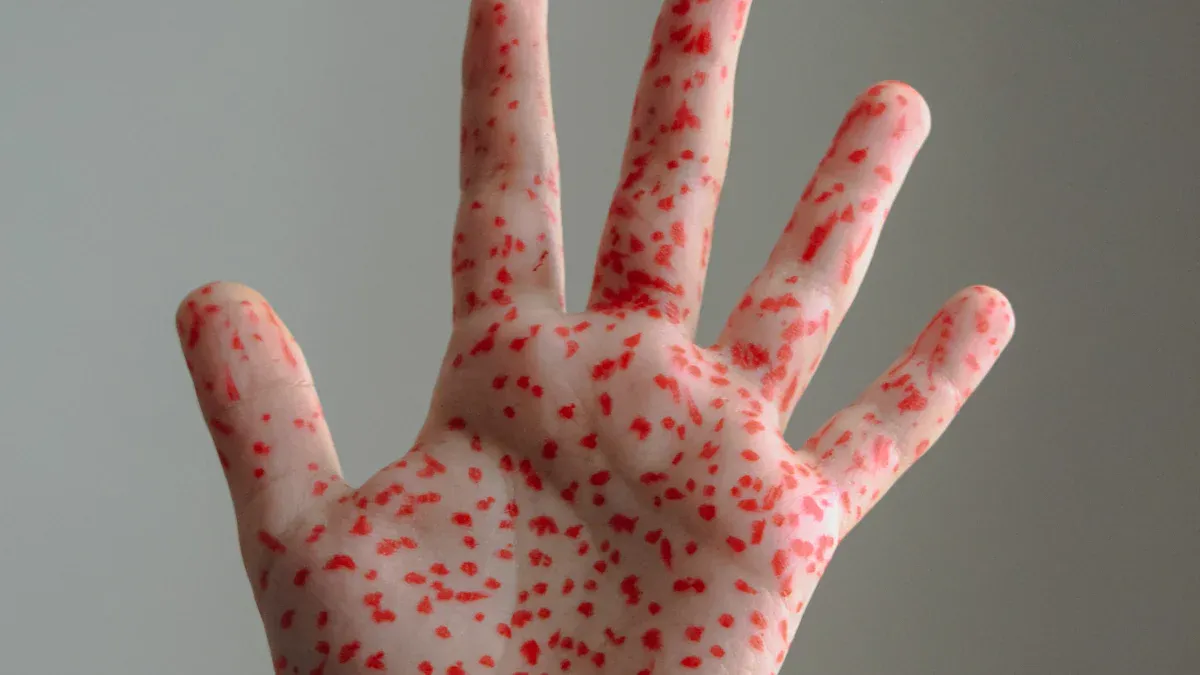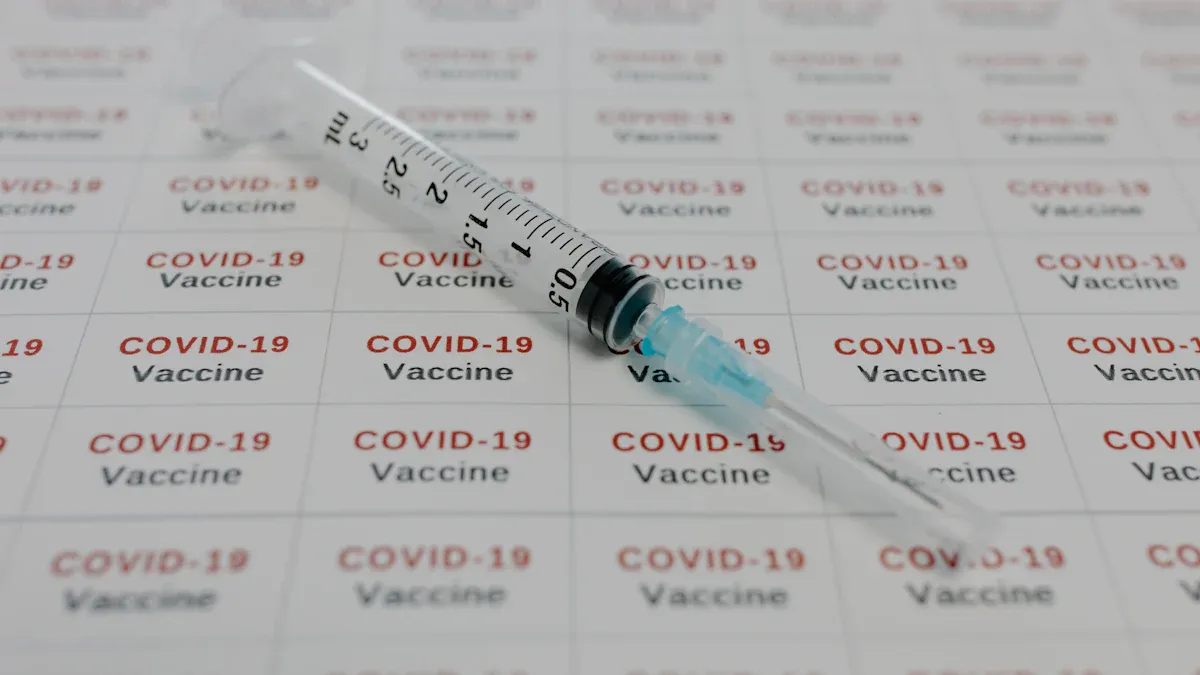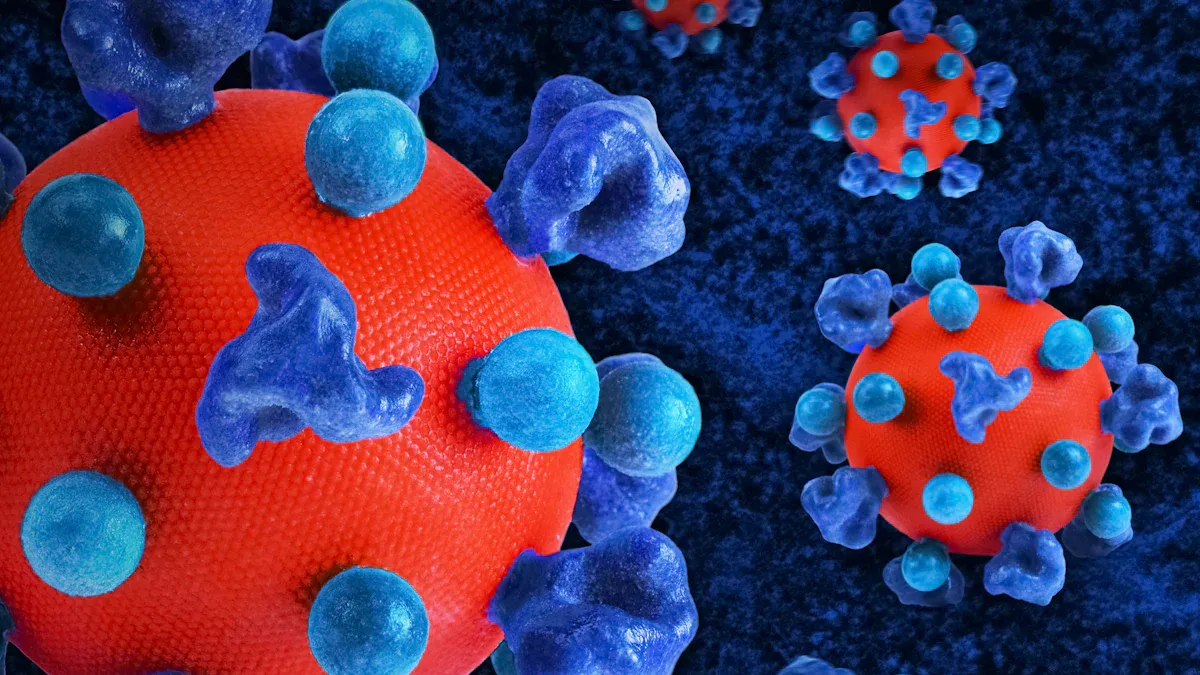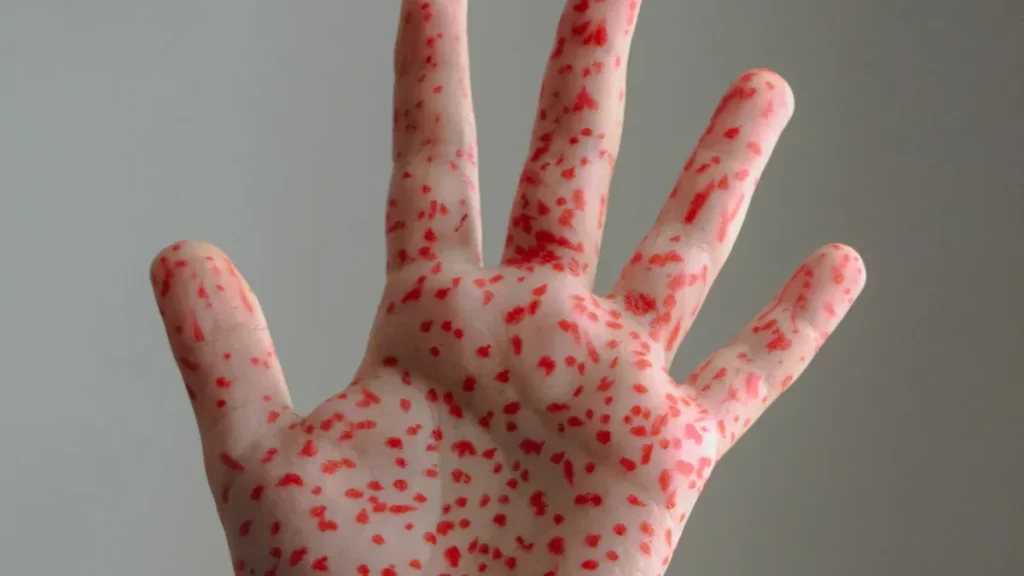News & Events
Rubella IgG: Why You Should Never Ignore Your Results

Rubella can cause serious problems, especially if you are pregnant. If you get infected early in pregnancy, your baby has up to a 90% chance of developing congenital rubella syndrome (CRS). Many infants with CRS do not survive their first year. In 2019, 32,000 children were born with CRS.
Statistic | Value |
|---|---|
Chance of CRS if infected in early pregnancy | |
Infants with CRS that die before first birthday | 33% |
Estimated children born with CRS in 2019 | 32,000 |
You need to know your rubella igg status. Many people do not realize how important testing and understanding results can be. Only 65% of medical professionals know about rubella and its effects, and vaccination rates are low. By acting on your igg results, you protect your health and help prevent outbreaks.
Key Takeaways
Know your rubella IgG status. It helps protect your health and prevents outbreaks.
A positive IgG result means you are immune to rubella. No further action is needed.
A negative IgG result indicates you need the rubella vaccine, especially if planning pregnancy.
Equivocal results mean your immunity is unclear. Follow up with your doctor for next steps.
Regular testing is crucial for healthcare workers and those planning to become pregnant.
Rubella IgG Overview
What Is Rubella IgG?
You may wonder what rubella igg means when you see it on your lab results. Rubella igg stands for immunoglobulin G, a type of antibody your body makes after you get exposed to rubella. These antibodies help your immune system recognize and fight the rubella virus. When you have rubella igg in your blood, it usually means you have protection against rubella. You can get these antibodies from a past infection or from the rubella vaccine.
Doctors use rubella igg testing to check if you have these important antibodies. If you plan to get pregnant or work in healthcare, you need to know your rubella igg status. Your results will show if you have enough igg to protect you and others from rubella.
Role in Immunity
Rubella can cause mild symptoms in most people, but it can be very dangerous for unborn babies. Your body uses antibodies to fight off infections like rubella. When you have anti-rubella virus igg antibodies, you have a strong defense against the virus. These antibodies stay in your blood for many years, sometimes for life.
Testing for rubella igg helps you and your doctor understand your immunity. If your results show high levels of igg, you are likely protected. If your results are negative, you may need the rubella vaccine. Sometimes, results are unclear, and your doctor may suggest more testing. Knowing your igg status helps prevent the spread of rubella and protects those who cannot get vaccinated.
Tip: Always review your rubella igg results with your healthcare provider. They can explain what your results mean and guide you on the next steps.
Rubella IgG Testing

Why Test for Rubella IgG?
You need to know if your body has protection against rubella. Testing for rubella igg helps you find out if you have enough antibodies to fight the virus. This is very important for women who want to get pregnant, healthcare workers, and anyone who wants to avoid spreading rubella. If you do not have enough igg, you could get sick or pass the virus to others. Testing for rubella immunity can prevent serious health problems, like congenital rubella syndrome in babies.
How Testing Works
Doctors use special tests called assays to check your blood for rubella igg. Most labs use enzyme immunoassays. These tests follow strict rules set by the World Health Organization (WHO) and must be FDA-approved. The assays look for anti-rubella virus igg antibodies in your blood. You may see your results as a number, which shows how much igg you have. Some labs use a single blood sample, while others use paired sera testing. In single testing, you give one sample. In paired sera testing, you give two samples a few weeks apart. Paired sera testing helps doctors see if your igg levels change, which can help with diagnosis.
Note: Always ask your doctor about the testing strategy used for your rubella igg test. This helps you understand your results and what they mean for your health.
Anti-Rubella Virus IgG Antibodies
When you get the rubella vaccine or recover from the virus, your body makes anti-rubella virus igg antibodies. These antibodies stay in your blood and protect you from getting sick again. Testing for rubella virus igg checks for these antibodies. If your results show enough igg, you are likely immune. If not, you may need a vaccine. The detection of these antibodies is key for clinical interpretation and helps guide your next steps. Accurate interpretation of your results is important for your health and for public health.
Interpreting Rubella IgG Results
When you receive your rubella igg results, you might see numbers and words that seem confusing. Understanding these results helps you know if you have protection against rubella. The amount of igg antibodies in your blood tells you if you are immune, at risk, or need more testing. Doctors use international guidelines to set the ranges for negative, equivocal, and positive results.
Rubella Virus IgG Levels
You can use the following table to see how your rubella igg results compare to standard ranges:
Result Type | |
|---|---|
Negative | < 10 IU/mL |
Equivocal | 9.9 – 10.1 IU/mL |
Positive | > 10 IU/mL |
Your lab report will show your igg level in IU/mL. IU stands for International Units. This standard helps doctors around the world compare results. If your igg level is below 10 IU/mL, you do not have enough antibodies to protect you from rubella. If your level is above 10 IU/mL, you have enough antibodies to show immunity. If your result falls between 9.9 and 10.1 IU/mL, your result is equivocal, which means it is not clear if you are protected.
Positive Rubella IgG
A positive rubella igg result means your body has made enough antibodies to fight off rubella. You have likely gained this immunity from a past infection or from the rubella vaccine. This result is very important for pregnant women. If you are pregnant and have a positive result, you protect both yourself and your unborn child from the dangers of rubella infection. You do not need further testing or vaccination if you have a positive result. You can feel confident that your immune system is ready to defend against rubella.
✅ Tip: Keep a copy of your positive rubella igg results. You may need to show proof of immunity for work or school.
Negative Rubella IgG
A negative rubella igg result means your blood does not have enough antibodies to protect you from rubella. You are at risk of getting rubella if you come into contact with the virus. This is especially important if you are planning to become pregnant or work in healthcare. If you have a negative result, you should talk to your doctor about getting the rubella vaccine. The vaccine helps your body make the antibodies you need. After vaccination, you may need repeat testing to confirm your immunity.
⚠️ Alert: If you are already pregnant and have a negative rubella igg result, you should not get the vaccine until after your baby is born. Your doctor will guide you on how to stay safe during pregnancy.
Equivocal Rubella IgG
An equivocal rubella igg result means your antibody level is close to the cutoff for immunity. Your result is not clearly positive or negative. If your igg level is between 9.9 and 10.1 IU/mL, you may not have enough antibodies to protect you from rubella. Women with antibody levels at or below 10 IU/mL are considered at risk for rubella infection. This is very important for women who are pregnant or planning to become pregnant. If you have an equivocal result, your doctor may recommend repeat testing or vaccination after pregnancy. You should not get the vaccine during pregnancy, but you can get it after your baby is born.
ℹ️ Note: Always follow up with your healthcare provider if you receive an equivocal rubella igg result. They will help you decide the next steps to protect your health.
What Your Results Mean and Next Steps
Positive: You have immunity to rubella. No further action is needed.
Negative: You do not have immunity. You should get vaccinated if you are not pregnant.
Equivocal: Your immunity is uncertain. You may need repeat testing or vaccination after pregnancy.
Understanding your rubella igg results helps you make informed decisions about your health. You protect yourself, your family, and your community by knowing your antibody status. Always discuss your results and next steps with your doctor. Proper interpretation of your rubella igg results can prevent serious health problems and stop the spread of rubella.
Clinical Significance of Rubella IgG
Pregnancy and Rubella
You need to understand how rubella affects pregnancy. If you get rubella while pregnant, your baby faces a high risk of congenital problems. These problems can include deafness, heart defects, and vision loss. Doctors use rubella igg testing to check your antibodies before or during pregnancy. If your results show low igg, you do not have enough protection. You should avoid exposure to rubella. If your results show high igg, your antibodies help protect your baby. You cannot get the rubella vaccine during pregnancy, so testing before pregnancy is important.
Tip: Ask your doctor about rubella igg testing before you plan a pregnancy. This helps prevent congenital rubella syndrome.
Planning Pregnancy
If you want to have a baby, you should check your rubella igg results. Testing helps you know if your antibodies are strong enough. If your results show you do not have enough igg, you should get the rubella vaccine before you become pregnant. Your body needs time to build antibodies after vaccination. Doctors recommend waiting at least one month after rubella vaccination before trying to get pregnant. Testing after vaccination confirms your results and shows if you have enough igg.
Steps for planning pregnancy:
Get rubella igg testing.
Review your results with your doctor.
Get vaccinated if needed.
Repeat testing to confirm antibodies.
Healthcare Workers
If you work in healthcare, you face a higher risk of rubella exposure. You should get regular rubella igg testing. Your results show if you have enough antibodies to protect yourself and your patients. Hospitals require proof of immunity. If your results show low igg, you need the rubella vaccine. After vaccination, repeat testing confirms your antibodies. Protecting yourself helps stop the spread of rubella in clinical settings.
Group | Recommended Action |
|---|---|
Healthcare worker | Regular rubella igg testing |
Low igg results | Get rubella vaccine |
High igg results | No action needed |
Public Health Impact
Rubella igg testing plays a key role in public health. Your results help doctors track immunity in the community. If many people have low igg, rubella outbreaks can happen. Immunization programs and rubella vaccination programs use testing to guide their strategies. When you know your results, you help protect others. High levels of antibodies in the population reduce the risk of rubella spreading. Testing and strong antibodies support public health and prevent clinical problems.
Note: Your rubella igg results matter for you and your community. Testing supports immunization programs and helps stop rubella outbreaks.
Immunology of Anti-Rubella Virus IgG

How Immunity Develops
Your body starts to fight rubella by making antibodies after you get exposed to the virus or receive the vaccine. These antibodies, called igg, help your immune system remember rubella and stop it from causing illness. Doctors use rubella igg as the main marker for immunity because it shows you have protection. When you have enough igg, your results show you are less likely to get sick from rubella. Testing for these antibodies helps you and your doctor know if you need more protection.
You can see how your immune system works in the table below:
Evidence Type | Description |
|---|---|
Humoral Immunity | Neutralizing antibodies are the best correlate of protection against rubella. |
Cellular Immunity | IFN-γ production helps protect you, even if your igg levels are low. |
Correlation | IFN-γ may boost igg secretion and create a stronger immune response. |
Long-Term Protection
After you develop rubella igg, your body keeps these antibodies for many years. This long-term protection means you stay safe from rubella even if you come into contact with the virus again. Your results from testing can show if you still have enough igg to stay immune. If your results show low igg, you may need another vaccine to boost your immunity. Clinical studies show that most people keep their antibodies for life, but some may lose protection over time.
Tip: You should check your rubella igg results every few years, especially if you work in healthcare or plan to have a baby.
Vaccine Response
Your body makes rubella igg after you get the vaccine, but the timing is different from natural infection. Here is how your antibody response develops:
You start to make antibodies more than 25 days after a natural rubella infection.
You develop antibodies more than 50 days after getting the vaccine.
Doctors use different testing methods, like ELISAs and hemagglutination inhibition tests, to measure your igg levels.
Your results help show if you have enough antibodies to protect you.
Both infection and vaccination lead to the production of rubella igg, but the speed and strength of the response can vary. Testing helps you know if your body responded well to the vaccine. Immunization programs rely on these results to keep communities safe.
Note: Always review your rubella igg results with your doctor to make sure you have strong protection against rubella.
Understanding your rubella igg results helps you protect yourself and your community from rubella. You should always review your results with a healthcare provider to make sure you have the right immunity. Regular testing and pre-pregnancy checkups keep your igg levels in check. Misunderstandings about immunity can lead to health risks. Here are some common misconceptions:
Misconception | Explanation |
|---|---|
Some people may still get infected even after vaccination. | |
IgM and igg are the same | IgM shows recent infection, while igg shows past exposure. |
High igg means full immunity | High levels do not always guarantee protection. |
For more support, you can find helpful resources at Testing.com, including guides, articles, and lab locations.
FAQ
What does a positive rubella IgG result mean?
A positive result shows you have enough antibodies to protect against rubella. You likely got these antibodies from a vaccine or a past infection. You do not need another vaccine if your result is positive.
Can you get rubella if you have a positive IgG result?
You have strong protection if your IgG is positive. Rarely, immunity can fade over time. Most people stay protected for life. If you work in healthcare or plan pregnancy, check your levels every few years.
Should you get vaccinated if your rubella IgG is negative?
Yes, you should get the rubella vaccine if your IgG is negative and you are not pregnant. The vaccine helps your body make antibodies. Wait at least one month after vaccination before trying to get pregnant.
What if your rubella IgG result is equivocal?
An equivocal result means your antibody level is unclear. Your doctor may suggest another test or recommend vaccination after pregnancy. Always follow your doctor’s advice to stay safe.
How often should you check your rubella IgG levels?
You should check your levels before pregnancy, if you work in healthcare, or if your doctor recommends it. Most people do not need regular testing unless they are at higher risk.

